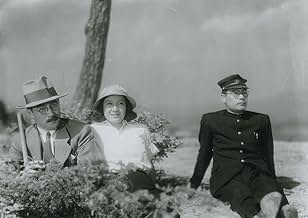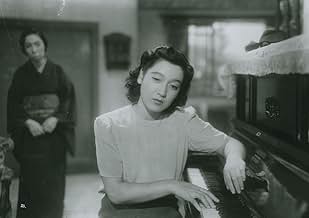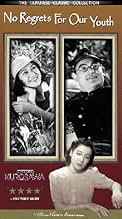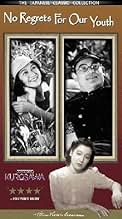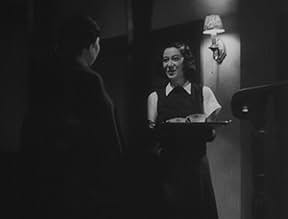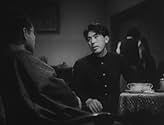The daughter of a politically disgraced university professor struggles to find a place for herself in love and life, in the uncertain world of Japan leading into WWII.The daughter of a politically disgraced university professor struggles to find a place for herself in love and life, in the uncertain world of Japan leading into WWII.The daughter of a politically disgraced university professor struggles to find a place for herself in love and life, in the uncertain world of Japan leading into WWII.
Featured reviews
Five years later, Noge visits Professor Yagihara and his family under the custody of the now Prosecutor Itokawa and tells that he is going to China. Yukie decides to move alone to Tokyo and years later, she meets Itokawa in Tokyo and he tells that Noge is living in Tokyo. Yukie visits Noge and they become lovers.
In 1941, Noge is arrested accused of ringleader of a spy network and Yukie is also sent to prison. When she is released, sooner she learns that Noge died in prison and she decides to move to the peasant village where Noge's parents live and are blamed of being spies by the villagers. She changes her lifestyle and works hard with Madame Noge (Haruko Sugimura) planting rice and earning the respect of her mother and father-in-law. With the end of the war, freedom is restored in the defeated Japan and the flowers blossom again.
Japanese militarists used the Manchurian Incident as a pretext to press the public for support to invade the Asian mainland. Any opposing ideology was denounced as "Red". The Kyoto University Incident a.k.a. Takigawa Incident was one example of this tactic.
Using this historical event and the Japanese tradition as background, Akira Kurosawa released in 1946 the fictional "Waga seishun ni kuinashi" a.k.a. "No Regret for Our Youth" to disclose the lack of freedom in Japan of those years. I do not recall in this moment any other film of this great director with such strong female character. Further, Kurosawa seems to be influenced by Yasujirô Ozu disclosing the relationship of Yukie with her family first and with Noge's parents in the second half of his story. My vote is eight.
Title (Brazil): "Não Lamento Minha Juventude" ("No Regret for Our Youth")
I was very impressed by how the film made the characters convincing in both the first act where they are college students, and then again nearly 10 years later. The characters have changed not only in appearance but in personality and mannerisms. It made the passing years very convincing.
The film is interesting from both an historical viewpoint and as a pure drama. This was made just a year or so after the Japanese surrender in World War II, and we get a good feel for how the militaristic government in Japan was able to gain the unquestioning support of most of the population. Some things never change, do they?
Highly recommended, although if you are starting out on Kurosawa, you may want to try something from the 1955 to 66 period.
The title of the movie comes from Noge's statement to Yukie halfway through the film - she does not know he has continued his involvement in the anti-war movement, although he has spent time in prison and China for protesting. He tells her he has no regrets for any of his actions. Yukie doesn't quite understand until he is arrested and eventually killed for spying. Yukie has the option of returning home to her parents, but instead she finds Noge's parents and moves in with them. There she suffers hardship, sickness, and the humiliation of being known as an anti-war collaborator. The central question of the movie is why did she do this? Was she trying to "hold on" to a lost lover? Did she feel guilt over not having been more active in the anti-war movement? Was this her penance for a mis-spent youth? Even more perplexing is the way she rebukes Isokawa at the end of the film by refusing to show him Noge's grave - Isokawa had supported Japanese involvement in the war.
Perhaps the film is about the mind-state of Japan after losing the war - those who opposed the war, or who struggled through hardship to live normal lives, should value their actions in spite of the consequences. Those who supported the war deserve scorn and share in the responsibility of bloodshed.
Did you know
- TriviaFilming in 1946, just after the war, many of the cast and crew were living very poor lives, going hungry quite often. One of the actors recalled a personal story of his stomach growling during filming, causing the scene to have to be shot again.
- Quotes
Title Card: After the Manchurian Incident the militarists attempted to unify domestic opinions in order to realize their ambition to invade Asia. They denounced as "Red" any ideology that might hinder their policy. Professors and students fought the suppression. The Kyoto University Disturbance was one of their struggles for freedom.
- ConnectionsFeatured in The Pacific Century: Reinventing Japan (1992)
- How long is No Regrets for Our Youth?Powered by Alexa
Details
- Release date
- Country of origin
- Language
- Also known as
- Bez žaljenja za našom mladošću
- Filming locations
- Production company
- See more company credits at IMDbPro
- Runtime
- 1h 50m(110 min)
- Color
- Sound mix
- Aspect ratio
- 1.37 : 1

